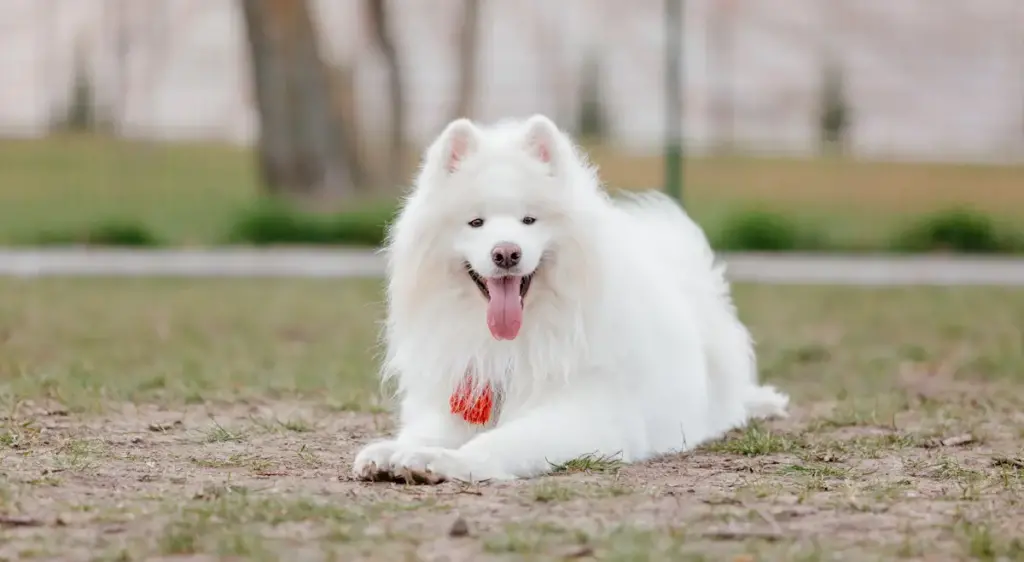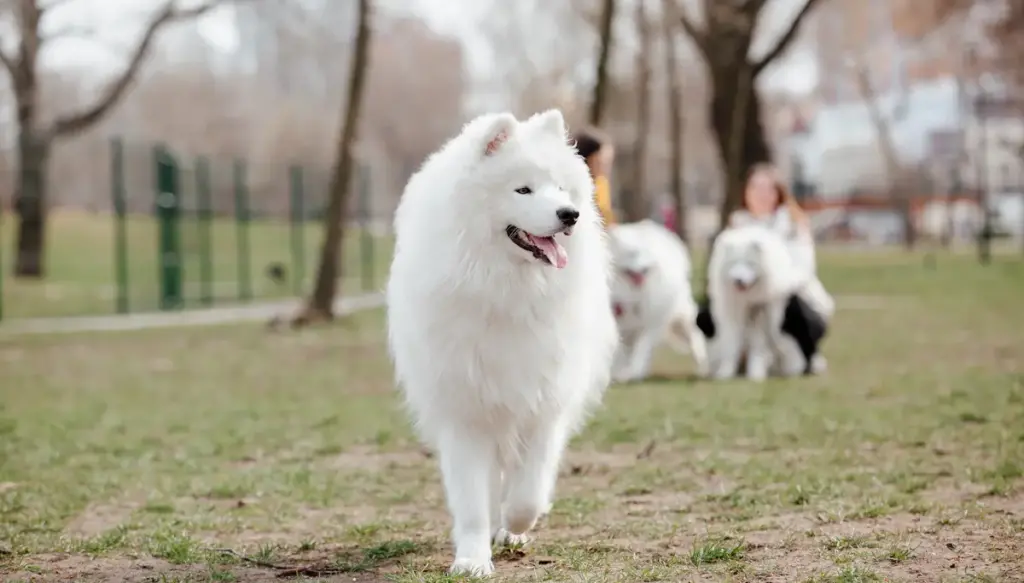Imagine the pristine snow of Siberia parting beneath the paws of the majestic Samoyed, its coat glistening like spun silk under the arctic sun. You’ve likely admired their distinctive smile— a trait that’s endeared them to dog enthusiasts worldwide.
But beyond their striking appearance, you’ll find a breed rich in character and history. As you consider the Samoyed for companionship, it’s essential to understand their unique traits and temperament. These former sled dogs carry a blend of independence and sociability, which may present joys and challenges in your home.
Their thick fur, which served as insulation against Siberian cold, requires considerable grooming, and they thrive on regular exercise. As we explore the depths of the Samoyed’s heritage and personality, you’ll uncover whether their enduring spirit and lively demeanor align with your lifestyle and what it truly takes to nurture one of these captivating creatures.
- Noise Level
- Energy
- Sociability
- Trainability
- Care
- Health
Overall
Summary
The Samoyed breed is known for its moderate noise level, high energy, exceptional sociability, above-average trainability, moderate care needs, and good health.
Samoyed: Traits, Temperament, and Care Guide
While Samoyeds are known for their friendly nature, they require consistent exercise and proper nutrition to maintain their health and prevent behavioral issues such as excessive barking.
Medium-sized dogs require 20-40 minutes of daily exercise to satisfy their energy levels and avert potential obesity.
Their personable Samoyed temperament flourishes with human interaction, making them prone to separation anxiety and disruptive vocalizations.
Daily brushing is crucial for their medium-length coats and fortifying the bond between you and your pet, reinforcing their sense of belonging.
Providing small amounts of top-quality food is essential; moderation in treats and sustenance is key to preventing weight gain.
Exploring the Characteristics of the Samoyed
Understanding the characteristics of the Samoyed is crucial for potential owners to ensure they can provide an environment that caters to the breed’s specific needs and tendencies. As a Siberian sled dog, the Samoyed possesses traits and temperament that require attentive care. Their friendly disposition craves human interaction; without it, they may resort to nuisance barking. They are medium-sized, energetic dogs that demand regular exercise to maintain health and prevent obesity.
Here is a concise overview of the Samoyed’s characteristics:
| Characteristic | Detail | Implication |
|---|---|---|
| Size | 19-23.5 inches, 50-65 pounds | Suitable for various living conditions |
| Personality | Friendly, personable | Requires companionship, prone to separation anxiety |
| Exercise Needs | 20-40 minutes/day | Essential for physical and mental health |
| Grooming | Daily brushing, heavy shedding | Requires time commitment, especially during shedding |
| Adaptability | Moderate temperatures, apartment living | Flexible but needs space for exercise |
Samoyed: A Comprehensive Profile and Guide
When planning maintenance and grooming, you must consider the Samoyed’s characteristic white coat, as it requires regular brushing to manage shedding and prevent matting.
Assess the breed’s need for companionship; Samoyeds are social animals that may develop behavioral issues if isolated or neglected.
Their dietary requirements and exercise needs are crucial to preventing obesity and maintaining their health. A balance of high-quality food and daily physical activity is essential.
Everything You Need to Know
Delving into the comprehensive profile of the Samoyed, this breed embodies a unique blend of friendliness and work-oriented diligence, marking it as an ideal companion for active households. With their roots in the frigid expanse of Siberia, Samoyeds were bred to herd reindeer and pull sleds, tasks that have instilled in them a remarkable blend of strength and gentleness.
- Samoyed Breed Profile
- Height: 19 to 23.5 inches
- Weight: 50 to 65 pounds
- Lifespan: 12-14 years
- Care Requirements
- Exercise: 20-40 minutes of daily exercise
- Diet: Small amounts of high-quality food
- Health: Watch for signs of obesity; requires daily exercise to maintain fitness
As an analytical point of reference, the Samoyed’s intelligence and independence are counterbalanced by their need for human interaction, rendering them unsuitable for prolonged solitude.
Discovering the Temperament

Samoyeds’ amiable nature, intelligence, and independence paints a complex picture of their overall temperament. These friendly dogs are gentle, making them good with children and devoted companions within the familial unit. However, their initial wariness around strangers must be acknowledged as part of their discerning disposition. They possess a strong herding instinct, indicative of a high prey drive, which may manifest in herding family members or pets.
Your Samoyed’s need for regular mental and physical exercise can’t be overstated—engagement is key to mitigating potential stubborn streaks. Moreover, commitment to their grooming is non-negotiable, ensuring their well-being and fortifying their bond with you, their pack leader.
Samoyed: Is It a Good Fit for Families?
You may wonder if the Samoyed’s amiable nature aligns with the dynamics of family life.
Consider the breed’s need for companionship and its potential for problematic behavior when neglected or improperly socialized.
Analyzing its compatibility with children and family settings requires understanding the Samoyed’s social and exercise needs, alongside its herding tendencies.
Assessing Samoyed’s Compatibility with Families and Kids
When considering a Samoyed as a family pet, it’s important to note their inherently friendly disposition and strong bond with family members, making them a potentially excellent addition to homes with children. These loyal dogs can thrive in a family setting, provided certain conditions are met:
- Compatibility with Children and Family Dynamics:
- Require close supervision with younger children due to herding instincts
- Adapt well to the often noisy and dynamic nature of family life
- Ensuring a Harmonious Household:
- Need regular exercise and mental stimulation to maintain good behavior
- Positive reinforcement is key in training and socialization
Understand that while Samoyeds are affectionate, a structured environment that includes proper training and supervision with other pets is crucial for a harmonious family integration.
Samoyed Adjustability Quirks
Although highly adaptable to various living environments, Samoyeds require ample exercise and engagement to prevent behavioral issues related to their innate herding instincts and need for companionship. You’ll find that they need daily physical activities and mental stimulation to remain well-adjusted. Their independence and intelligence can lead to a certain stubbornness in training. Hence, patience and consistent positive reinforcement are crucial.
Without proper attention, Samoyeds may exhibit distress through behaviors such as fussiness or fur plucking. Additionally, their herding solid instinct could manifest in chasing or nipping behaviors. It’s imperative to understand that Samoyeds aren’t suited to being left alone for extended periods; they seek your presence, and absence may result in nuisance barking or other signs of separation anxiety.
Samoyed Obedience Essentials

You must leverage positive reinforcement when training your Samoyed, as it aligns with their independent disposition.
Early and consistent socialization is imperative for them to develop proper canine manners and ease around other animals.
To curb their potential for mischief, provide ample mental challenges and consistent, patient guidance to reinforce obedience.
Effective Training Strategies
To effectively train your Samoyed, it’s crucial to employ positive reinforcement methods, such as offering treats and verbal praise. These methods can significantly enhance motivation and foster a positive learning environment. Samoyeds are generally easy to train, responding eagerly to consistent and clear guidance. A patient approach is vital, as this breed may exhibit independence.
Here’s an analytical breakdown of obedience training essentials:
| Strategy | Purpose | Outcome |
|---|---|---|
| Positive Reinforcement | Enhances motivation | Quicker learning |
| Socialization | Prevents behavioral issues | Well-adjusted pet |
| Obedience Training | Establishes boundaries | Reliable responses |
| Mental Stimulation | Prevents boredom | Engaged and happy dog |
Enrolling in puppy kindergarten can jump-start socialization and obedience, integrate your Samoyed into the community, and reinforce the sense of belonging you and your pet crave.
Exercise and Grooming Needs
Samoyeds typically require a daily exercise routine of 30 to 60 minutes to maintain their physical and emotional well-being. This breed exhibits a robust affinity for activity, making daily walks, playtime, or other forms of exercise essential. Neglecting their need for movement can lead to behavioral issues stemming from pent-up energy.
Alongside physical exertion, their dense double coat demands regular brushing to manage shedding and uphold coat health. Seasonal shedding intensifies grooming requirements, necessitating a more rigorous approach. Additionally, teeth brushing and nail trimming are indispensable aspects of their grooming regime. Without these practices, you risk dental issues and overgrown nails, detracting from their overall health.
Adherence to these care standards fosters community and shared responsibility among Samoyed enthusiasts.
Health Considerations
Considering a Samoyed’s health, it’s essential to recognize their predisposition to certain genetic conditions, including heart issues and progressive blindness.
The onset of diseases such as Samoyed Hereditary Glomerulopathy and hip dysplasia can impact this.
Proactive monitoring through regular veterinary check-ups is essential to mitigate potential health complications and ensure a quality life for your Samoyed.
Common Health Issues and Lifespan
Samoyeds are susceptible to several hereditary health issues while boasting a respectable lifespan of 12 to 14 years. These include hip dysplasia, diabetes, progressive retinal atrophy, and various heart conditions.
As a Samoyed owner, you’re part of a community that values proactive health management. Regular veterinary check-ups are crucial for early detection and intervention.
Hip dysplasia, a hip joint malformation, can drastically affect your Samoyed’s mobility and quality of life. Progressive retinal atrophy, leading to potential blindness, underscores the need for genetic awareness. Additionally, hereditary glomerulopathy, a kidney disease, may be a concern.
To safeguard the welfare of your companion, maintain their weight, provide a nutritious diet, and adhere to a thorough grooming regimen.
Embrace your role in promoting their longevity and vitality.
Is Samoyed the Right Dog for You?
Considering the unique traits and demands of the Samoyed breed, you must evaluate whether their active, social nature aligns with your lifestyle and capacity for companionship.
These active dogs need ample daily exercise to maintain their health and happiness. A Samoyed could thrive in your care if your schedule allows for long walks, play sessions, and interactive training.
However, they shed heavily, requiring frequent grooming to manage their dense double coats.
Their disposition is friendly, and they crave human interaction, which makes them not ideal for those who are away frequently.
Assess your readiness to provide enough exercise, socialization, and grooming. A Samoyed’s well-being depends on these commitments, shaping them into delightful companions for those who can meet their needs.
Alternatives for Samoyed: Friendly and Fluffy Cold-Weather Breeds
For those who adore the Samoyed’s friendly nature and fluffy coat, these cold-weather breeds offer a similar blend of warmth and charm.
| Similar Dogs | Short Description |
|---|---|
| Siberian Husky | Known for its friendly disposition and high energy levels, ideal for active families. |
| Alaskan Malamute | A powerful breed, known for its endurance and affectionate nature. |
| Keeshond | A spitz-type breed, known for its intelligence and friendly, outgoing nature. |
| Chow Chow | Known for its lion-like mane and dignified character. |
| Eurasier | A breed known for its calm temperament and loyalty, great with families |
Conclusion
In conclusion, the Samoyed’s captivating charm and amiable nature make it a treasured companion, proven by a notable 22% rise in ownership within the last decade.
However, their high-maintenance coat and exercise demands require diligent care. Assess your lifestyle critically before welcoming this spirited breed into your home to ensure a harmonious match that benefits both you and this affectionate Siberian sled dog.
Your commitment is key to a thriving relationship with a Samoyed.
